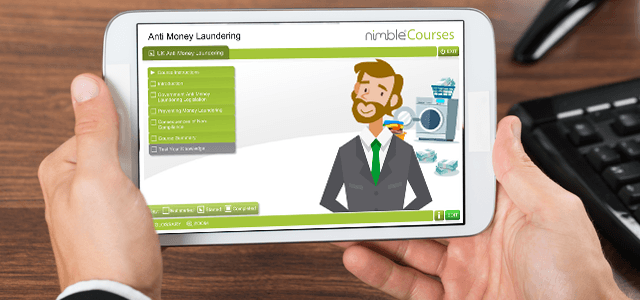HMRC estimates £40 billion each year is laundered through British organisations by criminals and terrorists. That’s a lot of dirty washing, isn’t it? But such large figures can be meaningless.
To contextualise it:
• £1 billion pays for 147,000 state pensions
• In the 2015 General Election the Conservatives promised £18 billion to go into the Right to Buy Scheme
• £40 billion pays for 4 months’ budget for the NHS.
If we don’t challenge and monitor our financial systems, we’re in danger of allowing ‘dirty’ money to flow into the bank accounts of criminals and terrorists. It kind of makes you think, doesn’t it?
Regulations devised by the government centre around the collective responsibility we all share to limit this kind of immorality as much as we can. Policy and procedure revolve around risk assessment.
Our Nimble Anti Money Laundering CPD certified course provides information, exercises to deepen understanding, and the protocols to ensure you comply with legislation. It does it with simple language too, so you’re not bamboozled by technical terminology (an impressive feat!). It offers a fantastic training opportunity for organisations of all types.
Risk assessments depend on everyone engaging with them in the first place, don’t they? Things can go wrong when people in an organisation say, “This doesn’t apply to me,” or “It’s someone else’s responsibility.” Even worse, if they simply know nothing about them. According to HMRC and the Institute of Financial Accountants, training is an important part of raising awareness of these risks. It should be provided for all ‘relevant employees’ – a term which includes ‘client-facing’ staff, such as receptionists and anyone answering the telephone to customers. So we shouldn’t limit this awareness raising to only those people who deal directly with the dosh!
When you consider checks need to be carried out on transactions over 15,000 euros, it makes you realise how many organisations must accept these responsibilities. It’s not just the territory of accountants, but also of car dealers, casinos, estate agents, jewellers and the like. The legislation, like all law, does not acknowledge ignorance. By not acting upon your suspicions, or asking pertinent questions or establishing identities, organisations can find themselves in a great deal of hot water. And laundry requires only low temperatures these days!
The point being made here boils down to the values of an organisation. According to the findings of the CCAB (Consultative Committee of Accountancy Bodies) in their research in 2014, one of their four recommendations centred on the need for professionalism. As one contributor noted, ‘The prevention mechanisms are only as good as those that enforce them’.
The moral of this story, because morality is important here, is that if you operate with the right values, maintain the correct protocols, your laundry remains clean. There’s no danger of your dirty laundry hanging you out to dry. Effective and regular compliance training is a good way to ensure your washing remains spotlessly clean.


0 Comments